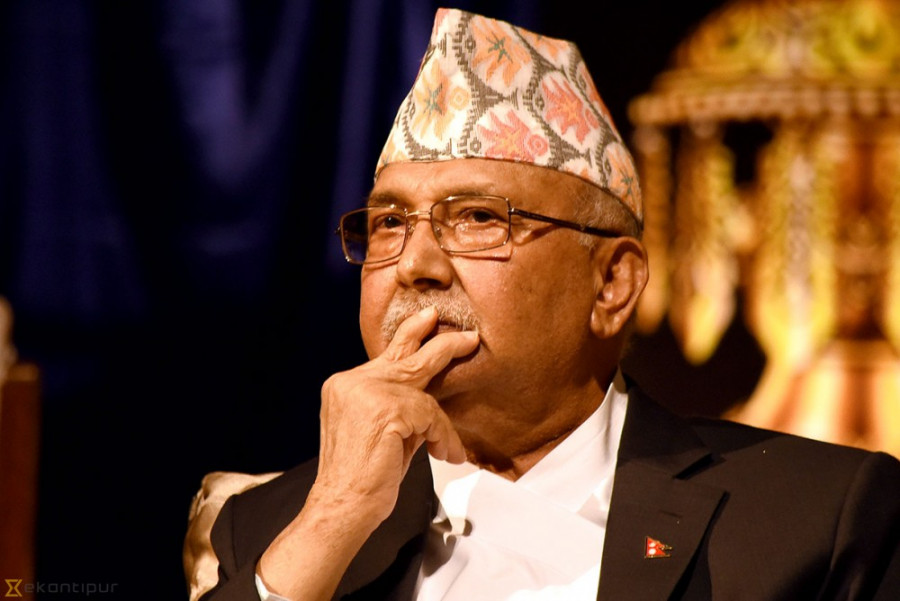The ruling Nepal Communist Party has been shamelessly severing the country’s long-standing cultural ties with India, so that it can pander to its ideological forefathers in China. But the Sino-India war-like conditions seem to have driven a deep wedge within the ruling party.
Over the past one month, Nepal’s Prime Minister KP Sharma Oli has artificially enlarged territorial claims over India, deployed troops at Indo-Nepal border and has even blamed India for spreading the Wuhan virus in the landlocked country.
The border clashes between India and China, and casualties on both sides are turning out to be a major turning point in the regional stability, and certain elements within the Communist regime in Nepal are wary of clearly choosing China as against India.
KP Sharma Oli has compromised the country’s sovereignty to China- the Chinese Ambassador Hou Yanqi is the architect of the deteriorating Indo-Nepal ties, and the Communist Party of China (CCP) is literally deciding the line that the Nepal Communist Party takes.
On Friday, the Nepal Communist Party held a workshop with the Communist Party of China. This was more of a coaching lesson delivered by the CCP to the ruling Communist Party in Nepal.
But the ruling party in Nepal is now a divided lot. Top party leaders are questioning the move to align with China so strongly at a time when Indo-Nepal ties have touched a nadir, and the Indian Army and PLA troops have clashed in Ladakh.
Former Prime Ministers of Nepal- Madhav Kumar Nepal, who is the head of the Nepal Communist Party’s international division, and Jhalanath Khanal skipped the workshop.
Interestingly, the workshop happened without the consent or knowledge of the party’s international division. Bishnu Rizal, who is the number 2 in the Nepal Communist Party’s international division revealed, “We had no information that such a conference was taking place in such a hurry.”
A senior party leader criticised the workshop, saying, “it is highly objectionable that the party is co-hosting Chinese counterparts at a time Nepal-India relations are at a low over the border dispute and constitutional amendment. Moreover, India and China are going through heightened tensions and there have been clashes between the two armies.”
The leader also said, “Going to the lap of China just because we have a problem with the Government of India at the moment is neither wise, nor our party’s policy.”
According to the Indian Express, a senior NCP leader also said, “Just because we have some differences at the moment with India over the border issue, such a videoconference with China on issues like governance and corruption shows bankruptcy of mind and insensitivity on the part of the organisers.
Meanwhile, the former Deputy Prime Minister and Foreign Minister of Nepal Narayan Kaji Shrestha has also criticised the workshop, its timing and its secrecy.
KP Sharma Oli had played his cards well by raising imaginary border disputes. Initially, it was difficult even for pro-India elements in Nepal to criticise the Oli government over this issue.
Border disputes, no matter how irrational, are emotive issues and no one dared to go against the Oli government for the fear of inviting the wrath of public opinion.
But now certain voices in Nepal are criticising how Prime Minister Oli is reducing the country into China’s Client State.
Nepal MP Sarita Giri, a member of Samajbadi Party, for example, went beyond the party-line to protest against Nepal’s government Constitution Amendment Bill related to the revised map of Nepal.
More and more leaders are however crticial of the growing proximity between the Communist Party of China (CCP) and the Nepal Communist Party.
Kamal Thapa, Chairman of the Rastriya Prajatantra Party (RPP) and former Nepal Deputy Prime Minister has come down heavily on the Nepal Communist Party.
Referring to the latest workshop, he asked what if other parties also start receiving training, and political and economic support from foreign parties that are friendly to them? He wondered what will happen to Nepal.
आपत्तिजनक नवऔपनिवेशिक अभ्यास
अब यसैगरि अन्य राजनीतिक दलहरुले पनि आफु अनुकुलका बिदेशी दलहरुबाट प्रशिक्षण तथा राजनीतक र आर्थिक सहयोग लिने क्रम शुरुगर्ने होभने नेपालको हालत के होला?के नेपाललाई अन्तर्राष्ट्रिय शक्तिहरुको रणनीतिक प्रतिस्पर्धास्थल बनाउन खोजिएको हो?
Stop this nonsense https://t.co/guVIGiNw07— Kamal Thapa (@KTnepal) June 19, 2020
The political situation is precarious in Nepal. The ruling party had supported Oli’s anti-India stance initially. But the party leaders wouldn’t have known how high the stakes were.
With the border skirmishes between India and China, Nepalese leaders, including the Communist leaders, understand that they have ended up punching way above their weight.
This could very well be curtains for KP Sharma Oli. He was already set to lose his seat owing to fissures within the ruling party but the Chinese Ambassador had put all her weight behind Oli to retain him in power. As a necessary corollary, Oli became a Chinese puppet.
But gradually, it is being understood in Nepal that it makes no sense to become China’s Client State at the cost of losing an ancient-era ally like India.
